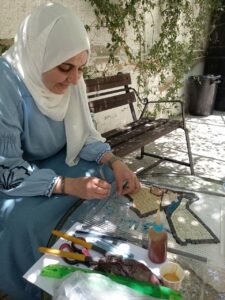The Jordan Livelihoods Project (JLP) is creating opportunities for Syrian refugees and Jordanians to reach their potential as business owners. JLP, which is funded by UNHCR and implemented by Blumont, works in seven governorates across Jordan to strengthen livelihoods and economic opportunities by supporting home-based businesses (HBBs).
JLP supports the socioeconomic and financial inclusion of Jordanians and Syrian refugees and fosters livelihood opportunities. In collaboration with local and community-based organizations, JLP is building entrepreneurs’ skills, formalizing businesses, and connecting business owners to new markets.

Shereen, a Syrian refugee, started her own business creating mosaics in Jordan.
One of those entrepreneurs is Shereen, a Syrian refugee living in Jordan. In 2013, Shereen fled the war in Syria with her three children to seek safety. Supporting her family was a challenge at first, but she saw opportunity in turning her artisanal skills into a source of income. With the support of JLP, she purchased the needed tools to expand her business, obtain a license, and register with the Ministry of Industry and Trade.
Shereen said, “I am proud of my business. It not only provides financial income, but it also gives me purpose.”
Since JLP began three years ago, UNHCR and Blumont have helped nearly 300 HBBs like Shereen’s become formally registered and licensed in Jordan, increasing economic opportunities and financial agency.
This livelihoods support is having a positive effect on the Jordanian economy and on the personal lives of HBB owners. In an assessment of the project’s 2021 activities, 92 percent of surveyed HBB owners reported that JLP helped them increase their income. On average, owners saw their monthly income more than double within months of formalizing their businesses. With increased income, the entrepreneurs reported being able to repay debts, cover household needs, and pay children’s school fees.
JLP support is having a ripple effect in Jordan as HBB owners hire people to help expand their growing businesses. Of the surveyed entrepreneurs, 40 percent had already hired additional support, and even more expressed plans to employ workers in the future.
However, despite the eagerness to expand their businesses, HBB owners are still facing challenges with registering and licensing their businesses. Processes in some municipalities can be lengthy and confusing; 42 percent of the surveyed HBB owners said they faced delays and other complications.
Opening more pathways for entrepreneurs to start their own HBBs and making the formalization process easier for all will help lift business owners and the Jordanian economy.
“Since the Jordan Livelihoods Project started in 2019, this project alone has received more than 8,000 applications from home-based business owners looking for support to grow and scale their businesses,” said Blumont’s Country Director Caroline Haddad. “The interest is there, and we know investment makes a difference.”
Read our findings from our 2021 assessment here.



